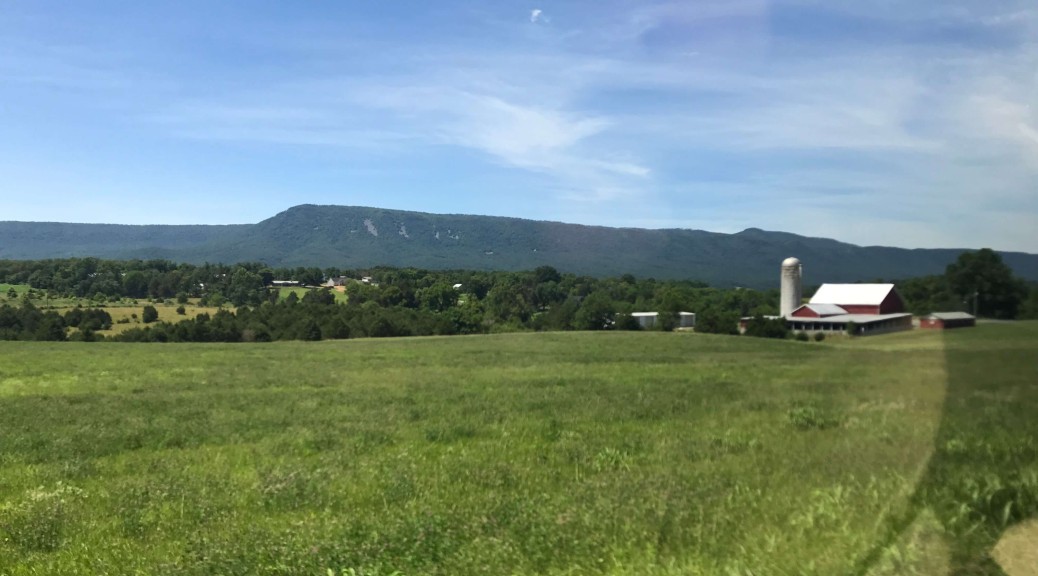As some of you may know, I grew up in a small country church in the northern Shenandoah Valley, with a view of the Blue Ridge mountains, at the edge of a cemetery where I’ll be buried one day. It is a United Church of Christ parish, and it shaped my early faith and sense of community; I’ve written a lot over the years about that church and the land and people surrounding it. My sister and I played in that cemetery, among the graves of our grandparents and great-grandparents. We sat in the pew in the back – on the right-hand side – and my mother played the organ there for 40 years. When the leaves have fallen off the trees in winter, we can see the church from the fields behind my uncle’s house, a few hills away. Generations of families have worshipped there, many of them from the farmland surrounding the church.
On the first Sunday of this year, our pastor there retired, and my parents and I went back again for his final service and the deviled-egg-fried-chicken-and-Jello-salad lunch afterwards. His final sermon was a message, a gift to his parishioners. He said, ministry lies in you. Listen closely. Make space for compassion. Welcome the stranger. Make a sacred space.
***
Last year on one Sunday evening in Lent, I walked down the hallway of St. Elizabeth’s Episcopal, in Roanoke, a small city church with a view of different mountains, on top of a hill next to a beloved oak tree. We had just finished one of a series of evening sessions on our Muslim neighbors, led by physician and teacher Dr. Saleem Ahmed, whom many of you know and some of you have also invited to your parishes for cross-faith workshops and conversations. Each Sunday evening for six weeks, we learned about the connections between Islam and Christianity, discovering the many things that connect us, working past and through the assumptions and misperceptions that inevitably are part of any relationship we have with those whom we may in some contexts consider “other.” We shared space, shared peace, spent time with our neighbors, sharing our not-so-different faiths.
That particular Sunday was also the one Sunday evening a month we hold a meditation and compline service. After the evening’s workshop and before compline, I walked past the room we call the “ark room” – there’s a Noah’s ark painted on the wall – glanced in, and saw Dr. Ahmed spreading his prayer rug on the floor, preparing to pray. So I tiptoed my way past and then back to the sanctuary, where half a dozen of us or so sat in the pews and said a quiet compline.
There was such a peace, such a quiet, wonderful holiness, being in this place where two prayers were lifted up under one roof – two liturgies, two devotions, two ancient faiths, held, gathered together in the same sacred space.
***
We are a liturgical church. And it is easy to be caught up in the rituals of Sunday mornings, when to stand, when to kneel, when to bow – those gestures we sometimes hear called the “gymnastics,” or “aerobics,” of the Episcopal church. Embedded deep in that ritual, that liturgy, is sacrament – most regularly, the Eucharist, which we celebrate every Sunday, reconciling ourselves to each other and coming to the table in love. Sacrament – whether communion, baptism, marriage, anointing of the dying, confession, confirmation or ordination – is both metaphor and reality – each sacrament becomes the thing it represents. When we come together at the Eucharist, we remember what binds us together, and we are bound together. When we baptize, we remember that we are beloved, and we are beloved.
Sacrament is where the human and the eternal, the secular and the sacred, come together, and the metaphors we practice in church liturgy intersect with the realities we practice in the world. When we celebrate the sacraments – when we marry, when we reconcile, when we baptize, confess, ordain – we bring the world into church. We make space, we occupy sacred ground.
I believe that sacrament is not only held by church walls, and that wherever we go is sacred ground. Sacrament is communion and baptism and reconciliation and confession – it is bridge-building and bread-breaking, dignity-respecting and friendship-making, recognizing our divisions and what we’ve done to make them, and celebrating when we can pray together under one roof.
As this world grows both smaller and larger, as we as citizens of this country and this communion and this planet become more connected, more diverse, more complex and more conflicted, we can welcome that diversity, that complexity into our sacred space, and we can carry that sacred space, that sacrament, out into the world. It is not tidy, it is not easy, it is not comfortable. It means we meet people where they are, religiously, spiritually, politically, relationally, at home and across the globe.
Poet Mary Oliver wrote, “my work is loving the world.” That, I believe, is our work as well.
